Number 7
HIMALAYAS PLUS
MARCH-APRIL 2024
Dear Friends,
Warm greetings from the Centre of Excellence for Himalayan Studies, Shiv Nadar Institution of Eminence, Delhi NCR. We are pleased to present the 7th edition of our Newsletter.
EVENTS
March and April saw a range of events we organized in collaboration with multiple partners.
On 14 March, we organized a day-long workshop on ‘Conservation of Material and Ecological Heritage in the Trans Himalayas’ with the Karakoram Collectives. The workshop featured presentations by scholars and practitioners from/on Ladakh. It explored various conservation-related themes, including the ecological impact of tourism, traditional agropastoral practices, market integration effects, spirituality, gender dynamics, and the preservation of cultural artifacts.
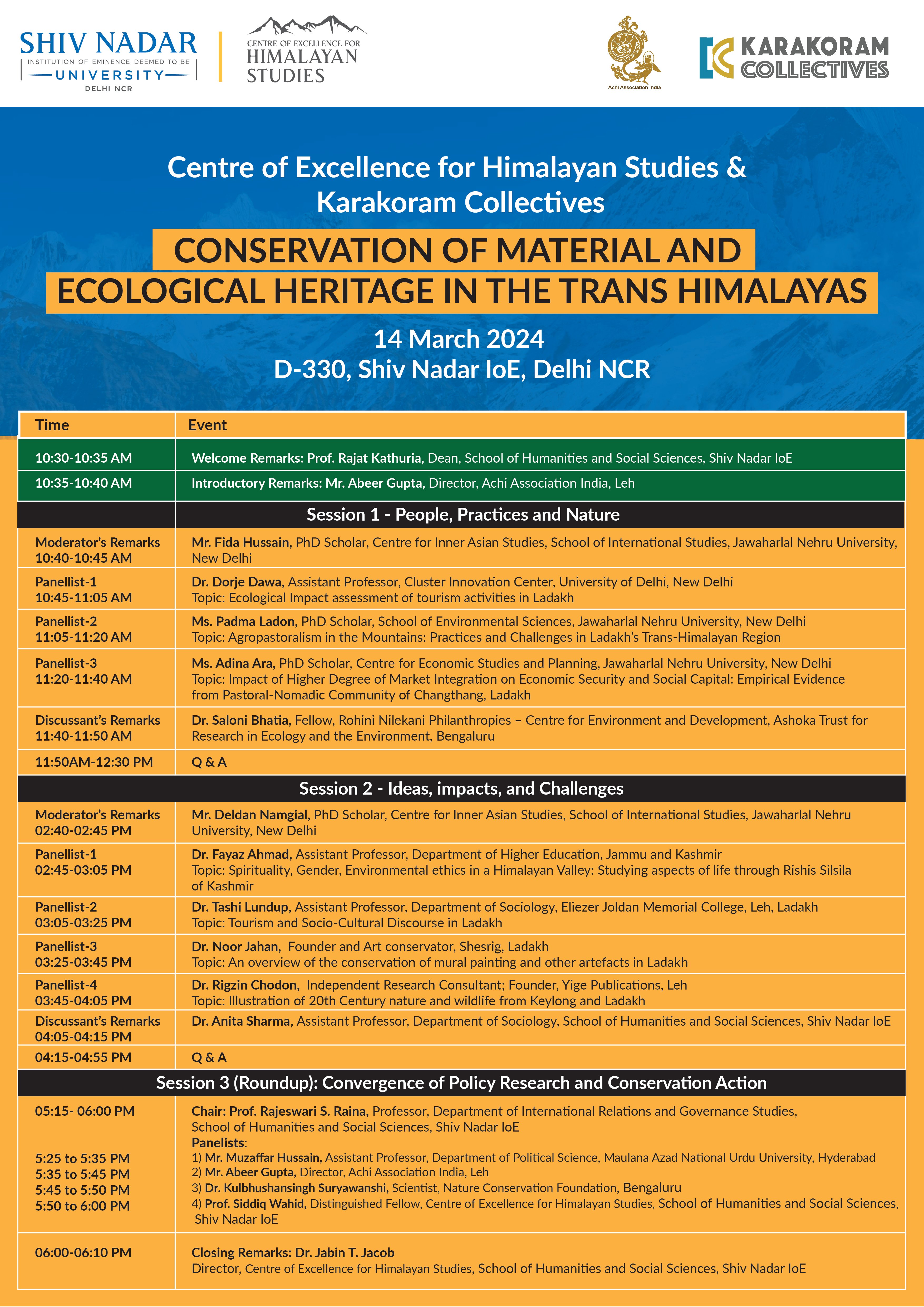

We organized two events in partnership with the Department of International Relations and Governance Studies, Shiv Nadar IoE:
On 14 March, Dr. Ashish Kothari, noted environmentalist and founder-member of the collective, Kalpvriksh, gave a talk on ‘Ladakh at a Crossroads’. Prof. Rajeshwari Raina of the Department of International Relations and Governance Studies, Shiv Nadar IoE chaired the session.

Dr. Gerald Roche, Associate Professor of Politics, at La Trobe University, Melbourne, Australia, spoke on ‘Politics of Language Oppression: Tibet, China and the World’ in a webinar in the afternoon on 27 March. The event was chaired by Dr. Devendra Kumar, Associate Fellow, CHS.

In the forenoon the same day, Dr. Rob Linrothe, Associate Professor Emeritus of Art History, Northwestern University, Chicago, USA, gave a presentation on ‘Early Buddhist Figural Art in Zangskar: Tracing Sources Upstream’. Prof. Siddiq Wahid, Distinguished Fellow, CHS, was in the chair.

CHS also partnered with the Centre for East Asian Studies, Jawaharlal Nehru University, New Delhi, for a conference on ‘Frontiers, Borderlands, and Trade in the Shaping of the Himalayan Region’. In the first session, Prof. Kaveri Gill, Non-Resident Senior Fellow at the CHS, and Mr. Claude Arpi, Distinguished Fellow, CHS, made presentations on ‘Buddhism as Soft Power Beyond Borders: The Exchange, Preservation and Efflorescence of the Nalanda Tradition’, and ‘The Himalaya as a Bridge: The Trans-Himalayan Trade across the Indo-Tibet Border before 1962’, respectively. Prof. Siddiq Wahid, Distinguished Fellow, served as discussant. In the second session, Dr. Anand P. Krishnan, Fellow, made a presentation titled, ‘Development Fix for the Frontier Regions: Pilot Free Trade Zones in China’, while and Dr. Devendra Kumar, Associate Fellow, spoke about urbanization in China’s borderlands using a case study of Shiquanhe in Ngari Prefecture and Bayi District in Nyingchi City in Tibet Autonomous Region. CHS Director, Dr. Jabin T. Jacob, was the discussant for this session.


CHS also took part in the University Day celebrations on Shiv Nadar IoE campus on 5 April, where we showcased our activities and publications.
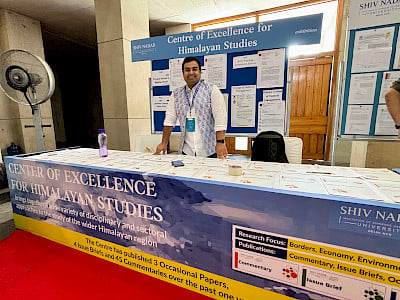
PUBLICATIONS
We published three Issue Briefs in this period.
The first of these Issue Briefs was by Dr. Sangay Lachenpa, Guest Faculty at Department of International Relations, Sikkim University, investigating the glacial lake outburst flood in Sikkim in 2023, and its impact on agro-pastoral practices and the role of local communities and institutions during such crises.
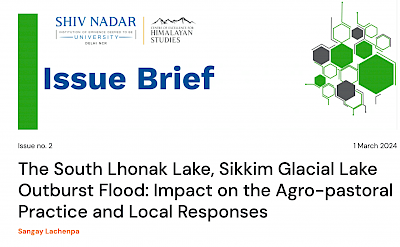
In another Issue Brief, Mr. Angshuman Choudhury, Associate Fellow, Centre for Policy Research, New Delhi, analyzed the Indian government’s decision to opt for a hard border policy with Myanmar, delving into the domestic dynamics and the political, economic and security costs involved.
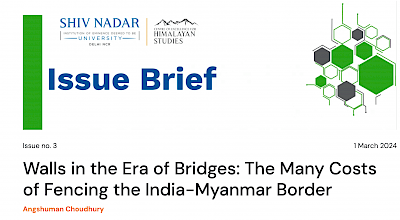
Dr. Devendra Kumar, examined the role of foreign affairs work offices at provincial, prefecture and county levels in Tibet Autonomous Region since 2014 in a third Issue Brief, identifying also the different constraints in the development of external economic linkages.
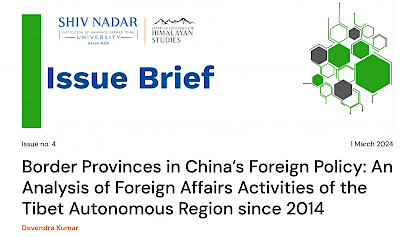
The CHS also published a Commentary by Mr. Rustam Ali Seerat, Research Scholar, South Asian University, New Delhi, that analyzed how the ruling Taliban in Afghanistan prohibited the celebration of ‘Nawruz’ – the new year for Persian speaking communities – but gave the go-ahead for celebrations of the Chinese New Year.
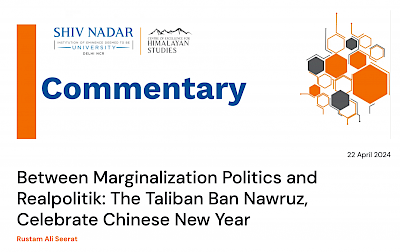
In a new initiative, we have decided to translate our publications into languages spoken widely in the Himalayas in order to expand accessibility to our cutting-edge analyses. To begin with, two of our publications have been translated into Urdu – a Commentary and an Issue Brief on Xinjiang. Translations into Nepali and Tibetan are in the pipeline.
Our researchers also publish on other platforms and you can find a selection of these writings on the CHS website.
We welcome writings/publications from those among you working on the Himalayas around the four broad themes – borders and identities, economy, environment and geopolitics. However, these are not exclusive and we are open to suggestions and supporting interesting ideas. Those interested may get in touch with us on our email [email protected] For more, see here.
IN THE MEDIA
In a co-authored piece for the Hindustan Times, CHS Associate Fellow, Dr. Devendra Kumar, and CHS Director, Dr. Jabin T. Jacob delved into the extension of Xi Jinping’s anti-corruption campaign into China’s financial sector, and how these measures signify expanding control of the Communist Party over the economy.
Dr. Jacob also authored two pieces for the Deccan Herald in the context of India’s general elections – in the first of these, he summarized the country’s China policy in the past decade and underlined the need for New Delhi to be more pro-active towards Beijing. He extended his argument, in the other piece, outlining the national security challenges China poses presently and is likely to pose in the future. For Natstrat, he analyzed Chinese Premier Li Qiang’s Work Report delivered at the National People’s Congress and their implications for the world as well as India.
Our Distinguished Fellow, Mr. Claude Arpi penned four pieces for Firstpost – in the first of them, he detailed the four trips to Tibet of Rahul Sankrityayan, the Indian author, essayist, and scholar on Buddhism, and explained how these formed part of the vibrant exchanges of India with the region. In another piece, commemorating the 65th anniversary of Dalai Lama and his entourage’s arrival in India from Tibet, at Tawang, he wrote on the happenings in 1959, Tibet’s status today and China’s continued claim-making on Arunachal Pradesh. In the context of China renaming places in Arunachal Pradesh, Mr. Arpi accessed old documents to argue how China’s claim-making lacked any historical basis. In the last of these pieces, he wrote on how the recent visit of Tibetan lama, Kyabgon Gongma Trichen Rinpoche to Bhutan, was a sign of change in Bhutan-Tibet relations that have otherwise been weighed down by mistrust and historical baggage.
Mr. Arpi also authored a piece in the Asian Age where he argued that the claim-making by China on Arunachal Pradesh was akin to a Chinese poker game, which in reality involved more bluffing than anything meaningful.
CHS Associate Fellow, Dr. Devendra Kumar, in a piece for The Strategist published by the Australian Strategic Policy Institute, explored how Xi Jinping’s anti-corruption campaign has also begun extending to the Belt and Road Initiative.
FACULTY UPDATE
CHS Director, Dr. Jabin T. Jacob has a chapter on the role of the Indo-Tibetan Border Police and the Sashastra Seema Bal in India’s national security architecture in a recently published volume, Institutional Roots of India’s Security Policy, edited by Milan Vaishnav (New York: Oxford University Press, 2024). You can see a video discussion of some of his findings here.
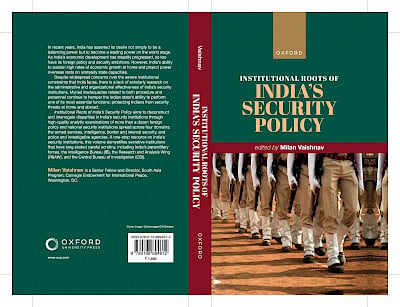
Dr. Jacob also contributed an essay on ‘China’s Undeclared Competition with India in Regional and Global Institutions’ in the Issue Brief on ‘The Hot Peace between China and India’, published by Institut Montaigne, under its China Trends series. He delivered a lecture titled, ‘Political Dynamics in China: Impact on Indian Foreign Policy and Security Interests’, Military College of Materials Management, Jabalpur, on 12 April and made a presentation on ‘Understanding Chinese Foreign Policy: Roots, Objectives and Practice’ as a panelist at the Workshop on China and Pakistan, organized by Integrated Defence Staff Headquarters, Ministry of Defence, Government of India, and the School of International Studies, Jawaharlal Nehru University, New Delhi, on 23 April.
Our Non-Resident Senior Fellow, Prof. Kaveri Gill delivered lectures on different topics – on 1 March, comparing modern and traditional monastic education systems, at the Jamyang Choling Nunnery, Dharamshala, Himachal Pradesh; on 2-3 April, on ‘Ethics in in Higher Education’, at Maitreyi College, University of Delhi; and on 13 April, on ‘Waste Policy and Practice in a Medium Hill Town of the Himalayas’, at OP Jindal Global University, Sonipat, Haryana.
Our Distinguished Fellow, Mr. Claude Arpi, was on an extensive tour of the Central Sector of the Line of Actual Control between India and China, in the latter half of April. He delivered three lectures at Lucknow (at a conference in the Central Command Headquarters of the Indian Army), and in Pithoragarh and Dehra Dun.
CHS Associate Fellow, Dr. Devendra Kumar’s article titled, ‘Securitisation of Economic Projects: A Case of Chinese Private Security Companies in Pakistan’, was published in the Journal of Defence Studies (Vol. 18, No. 1, January–March 2024). Dr. Kumar spoke on ‘Pitfalls of Researching China From a Distance’, at the Network for Advanced Study of China Fellowship Conference, organized by the Takshashila Institution, at Bengaluru, on 29-31 March 2024.
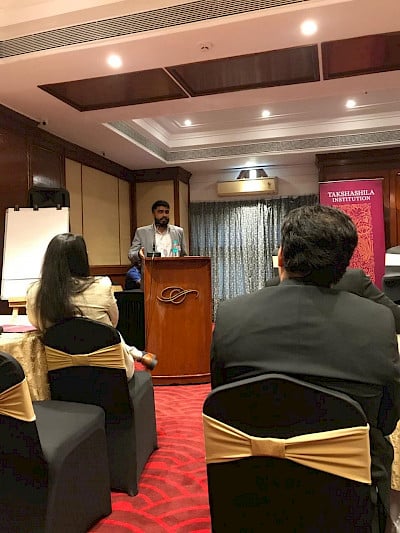
As always, you can remain up to date with our publications, events and activities either through our website, X (@Himalayas_SNU), and/or Facebook. We welcome your feedback and look forward to your continued support.
Share this: